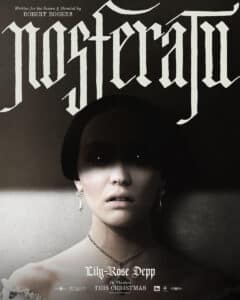
Nosferatu
In 1838, there’s this guy named Thomas Hutter in Germany, living in a place called Wisborg. He’s just married his lovely wife, Ellen. His job at a real estate agency sends him off to a spooky spot in the Carpathian Mountains. As soon as he gets there, he starts having creepy nightmares and sees some bizarre local customs. Things get weirder when a mysterious carriage shows up without anyone driving it and takes him to Count Orlock’s castle.
Count Orlock is this really eerie dude who asks Thomas to sign some sort of contract written in an ancient language that nobody really understands. Thomas quickly realizes he’s dealing with something not quite alive but finds himself stuck and powerless right away. So, he just hides out in his room.
Soon after, Count Orlock heads to town because he’s fixated on Ellen; apparently, he’s been obsessed with her since she was young. Thomas knows he has to escape somehow and warn everyone before it’s too late.
Back in Wisborg, a plague hits the city—conveniently giving Count Orlock all the cover he needs. He’s on this twisted mission: gives Ellen three days to fall for his creepy flirtation.
In all this chaos, one might think Ellen’s somehow summoned the trouble into town—maybe even pulled Nosferatu there with her own desires, like it hints at early on. But maybe it’s about society puttin’ pressure and boundaries around people’s true feelings or whatever. Even Dr. Sievers (a generally good guy) tries fixing Ellen’s struggles by telling her to wear a tighter corset! It’s kinda crazy how things unfold from there, you know?
So, the movie is all about Ellen, who’s battling the whole mermaid and saint identity thing. It’s really a story about strong, powerful femininity and how it deals with the rules society throws at you. Kinda like in Eggers’ first film, The Witch—except that one had a different twist at the end. The main idea still hangs on women dealing with their circumstances.
Ellen starts having these creepy dreams about a vampire during her teenage years, but she pushes them away for a while. Suddenly, they show up again when her husband decides to leave her alone at home—not because he wants to, but because he feels trapped by social norms himself. This movie takes a cool angle: desires grow when you try to keep them hidden in the dark. Only when you bring them out into the open do they lose their grip on you.
Then there’s Willem Dafoe’s character, who’s kinda like Van Helsing from Dracula but way more mystical. He suggests that in another era, Ellen would’ve been an important figure—a priestess of Isis—respected for her spiritual talents instead of being stuck at home.
Eggers nails this new spin on things beautifully in terms of style and approach.
This movie pays tribute to Murnau’s style by sticking with up-close shots and sometimes even having the actors look right into the camera. It’s like you’re really in it, with sharp cuts that shake things up or smooth camera moves that flow like a dance. The visuals are gloomy yet enchanting, thanks to Jarin Blaschke’s work, creating shadows and colors that almost seem faded but in a beautiful way.
As for the soundtrack, Robin Carolan went all out, giving us music that’s as dramatic as the old silent films. Everything fits together so well—costumes, sets, all of it is just spot-on. You’ve got actors bringing real intensity to their roles; Lily-Rose Depp takes on some wild moves taught by a Butoh dance choreographer, making her performance quite unique.
Then there’s Bill Skarsgård—wow! He’s transformed himself yet again. This isn’t your classic Dracula look; instead of fangs, he’s more of a grizzled corpse with an eerie presence and a mustache hanging on for dear life.
And let’s talk about Willem Dafoe—he’s having a ball as this new character. He’s not your typical Van Helsing. They’ve named him Albin Eberhart von Franz—a nod to both Albin Grau from the original film’s production team and Marie-Louise von Franz with her cool work on fairy tale archetypes and alchemy stuff. Basically, everything kind of vibes together perfectly in this movie world they’ve built.
Lawless pretty much stays right in its lane. If you’re familiar with Eggers’ style, there won’t be any real surprises here, except maybe a new prologue. It’s like the filmmakers knew their audience and delivered exactly that. The only catch? It takes its sweet time running longer than usual. But if you’re cool with that, it’s classic Eggers all the way.
To watch movies and TV shows online, please sign up with our partner, a legit streaming service.
Get Started ➔






